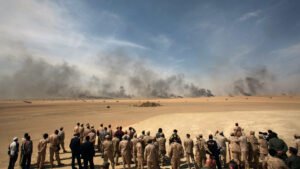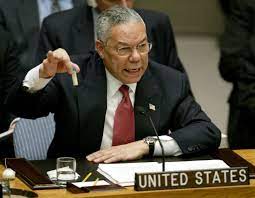Apr
28
Consequences of the US invasion of Iraq 2003
April 28, 2024 | | 4 Comments
In 2003, the United States, back by a coalition of allies, invaded Iraq. This resulted in a period of political unrest in the Middle East. Before I explain the effects of the invasion it is important to have a brief understanding of why the US invaded Iraq in 2003.

First going back to the 1990-91 Iraq invasion of Kuwait. The US backed coalition performed operations desert storm and desert shield to push Iraq out of Kuwait. The United Nations Security Council (UNSC) passed Resolution 687. Which order Iraq to shut down and destroy any Weapons of Mass Destruction (WMD). In 1998, Iraq stopped complying with UN protocols. Then in 2001, the al-Qaeda attacks on the US resulted in a shift of both US public opinion and the US government actions towards the Middle East, specifically Iraq. The Bush administration was already preparing to invade Iraq after 9/11 but needed to wait a little longer. In 2002, the US congress approved the use of military forces against Iraq. However, it was not until 2003 where US Secretary of State Powell asked the UNSC to allowed military action in Iraq due to their lack of compliance on WMD. Unfortunately for Secretary Powell he did not convince the rest of the Council, but the US was unwilling to wait and invaded anyway. It is important to remember the information Secretary Powell was using was unreliable and he agreed later that the information was “not solid” or false. There were no weapons of mass destruction found in Iraq.

The US invasion resulted in more than 200,000 Iraqis dead and Saddam Hussein dead. After the death of Hussein, there was an immediate lack of leadership in the state. The US military nor government were prepared to step to the power void they created. One of the most important effects this produced was the increased emergence and power for non-state actors and for Iranian influence in Iraq. The effect of not having a strong central government due to American invasion created a destabilized country. It was not just the death of Hussein, but the US forced the Ba’ath party from Iraq as they supported Hussein. The Sunnis had been favored under Hussein and were upset with the American invasion. This is what allowed for groups like Al-Qaeda to gain increased power resulted in additional destabilization and problems.

This was important for many reasons, one of them being increased terrorist attacks on US troops and Iraqi civilians. The extremists were not interested in creating peace, rather further destabilization, and crisis. It was not just in Iraq that the destabilization was created but in neighboring countries like Syria, Lebanon, Jordan, and more. It was not just the rise of non-state actors took advantage of the situation, but states like Iran did as well.
Iran, Iraq, and the Kingdom of Saudi Arabia (KSA) for many years created a tripolar system of power. However, it was common for only two of the states to be more powerful and in order to have the most power or influence they would ally with the third state. After the invasion of Iraq, it was clear that the tripolar system was coming to an end. This is important because now that Iraq was a shell of its former self both KSA and Iran wanted to both increase their regional power and limit each other’s power at the same time.
Comments
4 Comments so far
Hi Grace! Thank you for your insightful blog post on the U.S. invasion of Iraq in 2003. I enjoyed reading about the history of U.S. and Iraqi relations and engagements prior to the invasion in 2003, such as the military operations Desert Storm and Desert Shield and the attempt to remove Iraqi troops from Kuwait. I think this historical background is essential to understanding the reasons for the 2003 invasion, as it portrays the longstanding tensions between the United States and Iraq. One aspect of the U.S. invasion I find interesting is how the U.S. proceeded to invade Iraq, even after the UNSC declined the U.S. request to violate its WMD compliance laws. Do you think the U.S. made a mistake in invading Iraq? Is it problematic that the U.S. invaded Iraq based on faulty intelligence? If the U.S. can violate international law and invade another country due to national concerns, what implications may this have for regional and international politics? Should the U.S. invasion of Iraq serve as an example that nations can invade other nations without permission if the nation being invaded threatens a country’s national security?
Hi Caitlin, thanks for your comment! You asked some challenging questions! I think it was problematic for the US to invade Iraq especially with faulty intelligence. I think it sets a precedence that the US can do “whatever” it wants without consequences.
Thank you for your post, Grace. I enjoyed your discussion on how not only non-state actors benefitted from the power vacuum created after the U.S. invasion of Iraq, but state actors also were impacted. You specifically mentioned that Iran benefitted from this invasion, which is important to note. I thought it was interesting how you mentioned that the tripolar system ended and was shifting to a bipolar system. I know we mentioned that triangle between Iran, Iraq, and Saudi Arabia in class. Do you think that Iraq lost its “regional power” status after Desert Storm in 1991 or in 2003?
Hi John! Thanks for your comment. I think their regional power status began to decrease in 1991 but it was not until 2003 that they full lost their status as a strong regional power.